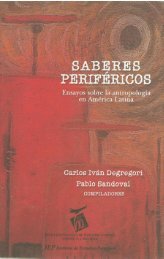blueprints
blueprints
blueprints
You also want an ePaper? Increase the reach of your titles
YUMPU automatically turns print PDFs into web optimized ePapers that Google loves.
210 | toolkit: an idea, a pencil, and paper<br />
Find In-Kind Resources<br />
If someone offers you a venue and a sound system for no fee, that is<br />
considered a resource provided in kind. Your partners may have other skills<br />
and resources to bring to the table as well. For example, partners whose<br />
operations already include advertising and public relations may be willing<br />
to provide those services for you. The same may be true of recording, photography,<br />
and any number of other services that might enhance your program.<br />
A local hotel or motel might provide free rooms; a restaurant might<br />
donate meals for visitors. As you consider what you need to make your program<br />
happen, remember that asking for in-kind donations can be an excellent<br />
way to let people help you without writing you a check. In-kind donations<br />
can be as valuable as any others, if not more, because they save money<br />
and both create and demonstrate community involvement. Make sure to<br />
get documentation from the in-kind donor that describes the donation and<br />
verifies its value.<br />
Find Money<br />
You will probably need to ask for money. Notice, though, that we put<br />
money last. This is because it’s hard to determine just how much you will<br />
need before you know what partnerships, volunteer staffing, and in-kind<br />
resources you already have in place. However, even if you have free space,<br />
free advertising and other services, and a volunteer staff, you will need<br />
money. Artists make a living from their work and both need and deserve<br />
to be paid for it. (This is one value driving the work of everyone involved<br />
in this book.) You may not be able to pay market rates at the beginning,<br />
and some writers, if they believe in your project or believe they have<br />
something beyond money to gain by participating, may accept reduced<br />
fees. But your goal should be to pay all artists something and to pay them<br />
as near to market rates as you can, with a very few exceptions we’ll go<br />
over later.<br />
Fortunately, funding sources are out there. As we said earlier, local arts<br />
councils and other organizations might be able to chip in for honoraria on<br />
an ad-hoc basis. Most arts councils and humanities councils also give formal<br />
grants to nonprofit organizations involved in literary programming. (Note<br />
that there is a process involved in becoming a nonprofit organization for tax<br />
and grant purposes, which we address in part 2 of this Toolkit. You can also<br />
find useful websites about how to undertake this in Nuts, Bolts, and Widgets.)<br />
In addition, most states and many communities are homes to private







